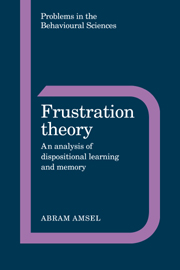Book contents
- Frontmatter
- Contents
- Preface
- List of abbreviations
- 1 Introduction: reward-schedule effects and dispositional learning
- 2 Motivational and associative mechanisms of behavior
- 3 Frustration theory: an overview of its experimental basis
- 4 Survival, durability, and transfer of persistence
- 5 Discrimination learning and prediscrimination effects
- 6 Alternatives and additions to frustration theory
- 7 Ontogeny of dispositional learning and the reward-schedule effects
- 8 Toward a developmental psychobiology of dispositional learning and memory
- 9 Summing up: steps in the psychobiological study of related behavioral effects
- 10 Applications to humans: a recapitulation and an addendum
- Appendix: some phenomena predicted or explained by frustration theory
- References
- Name index
- Subject index
9 - Summing up: steps in the psychobiological study of related behavioral effects
Published online by Cambridge University Press: 20 March 2010
- Frontmatter
- Contents
- Preface
- List of abbreviations
- 1 Introduction: reward-schedule effects and dispositional learning
- 2 Motivational and associative mechanisms of behavior
- 3 Frustration theory: an overview of its experimental basis
- 4 Survival, durability, and transfer of persistence
- 5 Discrimination learning and prediscrimination effects
- 6 Alternatives and additions to frustration theory
- 7 Ontogeny of dispositional learning and the reward-schedule effects
- 8 Toward a developmental psychobiology of dispositional learning and memory
- 9 Summing up: steps in the psychobiological study of related behavioral effects
- 10 Applications to humans: a recapitulation and an addendum
- Appendix: some phenomena predicted or explained by frustration theory
- References
- Name index
- Subject index
Summary
In Table 1.2 (p. 11), I outlined a six-step strategy that might be followed in an attempt to understand the development of what I have called dispositional learning, as it is studied in the context of the reward-schedule effects. Let us sum up by returning briefly to this strategy and asking to what extent it can be said to have been followed in this book.
Step 1: Observe a number of related effects
The observation and description of a family of related behavioral effects make up a large part of Chapters 3 and 5, are a basis for the developmental work in Chapter 7, and are a feature of the Appendix. The important feature of these reward-schedule effects is that all of them are manipulations of reward and nonreward (or reduced or delayed reward) in some kind of sequence, each of them different from all the others. They are then a family of related effects in this sense, but perhaps more important, also in the sense that each of them is a kind of learning that combines simple classical and instrumental conditioning, that involves many experiences or “trials,” and that governs long-term tendencies or dispositions – for example, to approach or avoid, to persist or desist.
Step 2: Develop a conceptualization of the effects
These effects (including discrimination learning) are conceptualized in terms of the body of empirical constructs that comprise frustration theory, and this is the principal subject matter of Chapters 3 and 5.
- Type
- Chapter
- Information
- Frustration TheoryAn Analysis of Dispositional Learning and Memory, pp. 205 - 215Publisher: Cambridge University PressPrint publication year: 1992



